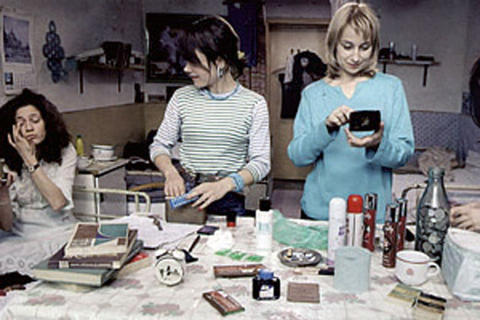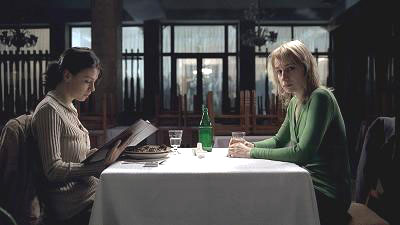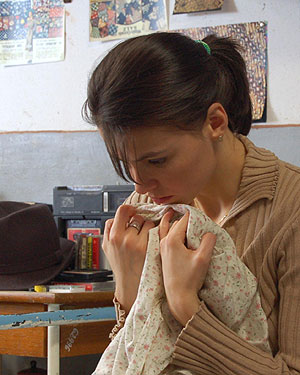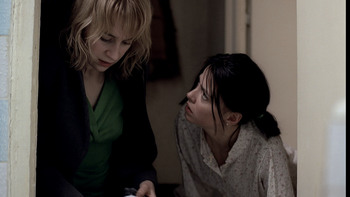Ellen and Jim Have a Blog, Too
We are two part-time academics. Ellen teaches in the English department and Jim in the IT program at George Mason University.


4 months, 3 weeks, & 2 days: one tough movie · 22 February 08
Dear Harriet,
I travelled into Washington D.C. today to the E-Street Cinema in order to see this film, as I assume it will not come to my local better cinema in Virginia.
4 months, 3 weeks, & 2 days by Cristian Mungiu is a powerful effective film about the experiences of two young women in Romania as one (Ottilia) helps the other (Gabriela ‘Gabita’ Dragut) succeed in terminating an unwanted pregnancy. The film’s importance derives from the truthful dramatization of the way people really treat one another. On the local and particular level yes the film is about one young woman’s abortion (and the difficulties her friend experiences in helping her), the related issue of the friend’s relationship with her boyfriend (Adi Radu) who seeks to dominate and control her; & it depicts the conditions of life in Rumania under the dictator; but on the general level it transcends these themes to dramatize the real indifference of people to one another, and how the social circumstances which they create (in Rumania in a daily way not all that different from anywhere else) make it possible for them not to commit emotionally to one another any more than they have to, at the same time as it’s hard for people to protect themselves against anyone with power over them (anyone who has something someone else wants or needs).
What I liked best about it was how both girls come through. They survive it by doing what they have to to get the abortion, hide it, and in order to carry on with their lives as young women students who hope to support themselves independently someday. They are survivors the way the women in Almodavor’s Volver are. You could say it is a film about two women’s friendship.
I recommend this film to everyone. It shows up the cruel fallacies of evasive lying films like Juno, Waitress and Knocked Up—& indeed much commercial sentimental melodrama.
As the film begins, Gabriela ‘Gabita’ Dragut (Laura Vasiliu) and Ottilia (Anamaria Marinca) are in their college dormitory room in the morning. They are getting various stuff together to get through the coming afternoon when Gabita is to meet with a doctor, Viarel aka Domnu’ Bebe (Vlad Ivanov), who has agreed to perform an abortion.
Gabrita getting ready
Abortion is illegal in Rumania so they must rent a room in a hotel and do everything with the greatest secrecy. We see right away that Gabrita is a passive frightened young woman who relies on Ottila’s relative willingness to act and engage with others: Gabrita has failed to get a room in the hotel she said she would so Ottilia has to rent a much more expensive room in a nearby hotel. Gabrita can’t face seeing the doctor before she has to so Ottila meets him for her. Gabrita lies continually, evades admitting that she has not done what she promised; her lies include pretending she is less pregnant than she is. While there is no overt strong affection between the two, & Ottilia justly gets angry at Gabrita for putting her in unnecessarily mean and hard conditions by her lies (for example, they could have tried to get a more expensive abortion through a woman friend had Gabrita been willing to act), Ottilia acts loyally to Gabrita throughout and Gabrita depends on her throughout the film: they are getting through life together.
The most painful scenes occur in the hotel room between the young women and this inexpensive doctor. Bebe is indeed cheap. When he comes into the room, after an opening self-introduction, he sizes them up as two desperate young girls:

Gabrita telling her story, Ottilia and Bebe listening,
He then acts abrasively and presents himself as doing the abortion with great reluctance (he is endangering his career, can be put in prison); he is rude and coldly willing to walk out on them unless both of them have sex with him first. They have brought 3000 lei (minus the hotel fee they had unexpectedly to pay), and he laughs at that sum. He doesn’t want it. Sex or no abortion.
The vileness of this gambit is brought home to us by the girls’ horror and disgust, by their giving in because Gabrita is desperate, and by afterwards showing us Ottila running in to the bath to douche herself and the ravaged state of Gabrita’s face when we see her preparing to lie down afterwards to let him do the procedure.
The depiction of the abortion is graphically realistic. Gabrita has (of course) forgotten to bring a plastic sheet so she tears a plastic bag up and lies down on it on a sheet placed on top of the bed. Bebe takes out his equipment from a suitcase and we watch him put a probe in her. She is to lay there and not move. The procedure could end in bad bleeding and even death, partly because she has lied and is 4 months pregnant (not 2 as she has claimed). Ottila leaves Gabrita in the room for 2 hours afterwards as she must go to the apartment of her boyfriend, Adi (Alexandru Potocean) for a while as it’s his mother’s birthday and he has promised his parents he will bring his girlfriend to meet them at a small party they are holding for his mother. We are fearful Ottila will not manage to get back (the bus service does not seem reliable and her boyfriend exigeant); Ottilia takes the only room key with her the girls have been given (to protect her, but at the same time it leaves Gabrita no way to leave the room easily as Ottilia locks her in); we are fearful Gabrita’s condition will worsen and she will not be able to expel the fetus and placenta without ending up needing to go to a hospital.
Ottila though does make it back and finds Gabrita in bed; she had managed on her own to expell the fetus & placenta on a towel on
the bathroom floor.
The camera focuses on the fetus and we can see the outlines of a coming human being around which is wrapped flesh-like tentacles (the placenta?). Ottilia must bundle this object in a towel and go to a high building nearby and throw it down a chute. She now leaves Gabrita in the room with the key and goes forth into the streets. We see her uncertain what to do, where to go. She is tempted to throw it into a large garbage disposal can in the streets, but a dog frightens her away. Finally she finds a suitable hotel, goes in, climbs the stairs, & disposes the bundle safely.
Ottilia sees her boyfriend, Adi, twice. Their dialogues make this secondary story a parallel instance to Gabrita’s (we are not told how she got pregnant). Ottilia first encounters Adi on her way to secure the hotel room, and then again during the hour or so Ottilia spends in his parents’ apartment. Adi pressures her to come to this party, and when she does, he is dissatisfied with her behavior as she wants to leave early and is clearly in a stressed state. It also emerges that last week when Adi and Ottila had sex, he came in her, and as she puts it, “didn’t give a shit” what would happen to her. She demands to know what he would do were she to get pregnant. She is in a highly traumatized state by her experience with the abortionist and watching the abortion and coping with Gabrita’s passivity and dependence. He clearly has no plans, and even says well they could get married, maybe. She is not keen on spending the rest of her life bossed by him. They quarrel; he tries to kiss her but she’s having none of it, and insists on leaving at the time she had originally planned to get back to Gabrita.
All the incidents and the mise-en-scene surrounding the main story reinforce our sense of these girls’ powerlessness, relative poverty, and the injust way the state of Rumania operates towards them and all individuals not in powerful positions. All the buildings we see are run-down; to get anything from anyone you have to present an ID, and the person can take it from you to control your behavior—and they do. There are buses which appear to function and these are clean; there are bridges which seem sturdy enough (as opposed perhaps to many bridges in the US today), but the streets are bare of cars and those seen are in a sad state. The girls’ dormitory is in a poor condition; everyone cadges for cigarettes; the girls busy themselves putting on make-up.

A scene in the dormitory (Ottilia’s green blouse looks blue)
At one point Ottilia buys some Kents from a black market peddlar. Ottilia has to cajole, bully, and pressure the clerks to give her a room (at a high price). We see a class system is still strong in people’s psyches. At Adi’s parents’ house Ottilia is made uncomfortable by the way Adi’s parents reacted to learning her parents are not educated middle class people. The casual conversation of his parents with their visiting middle-aged friends is all about the crony politics of their lives in their offices, the difficulty of getting meat if you don’t know anyone (the mother had to stand on line for 3 hours to get some meat for this dinner). At night as Ottilia comes into the hotel and then leaves to get rid of the fetus & then returns we see a wedding party going on; many are drunk; the clerks on duty are drunk and she manages to get upstairs without having to leave her ID card with them (it’s upstairs and they at first won’t let her go upstairs to get it). So the sometimes strained as well as the sordid frivolous & ostentatious ways people get through life both in public & at home are part of the scene too.
The movie ends in the restaurant on the bottom floor of the hotel
in the late night hours (or near dawn). Gabrita has gone there to get a meal as she is now hungry. Ottilia first went upstairs to make sure Gabrita is all right, & becomes anxious because Gabrita doesn’t open the door. She goes downstairs to phone for Gabrita upstairs but is told Gabrita is in the restaurant. Gabrita has ordered a meal and Ottila asks for another bottle of mineral water. The waiter brings to them a plate of food from the wedding, and says this is what the hotel has to offer. He will come back shortly and take their order.

The final scene
Gabrita then attempts to question Ottila: did she bury the fetus? Ottilia responds that they had agreed that once the abortion was over, they would not discuss what had happened, what either of them had done or experienced during the ordeal ever again. This silences Gabrita.
And the screen goes dark. The film ends. Tension is built and ongoing throughout because we are led to identify with Ottila in her strenuous efforts to help Gabrita against many obstacles, including Gabrita’s own lies, Ottilia’s having to leave Gabrita, and Gabrita not answering the phone when Ottila calls; most of the time Gabrita shows herself to be unrealistic & unresponsive. Yet they are clearly staying together and will return to their dorm to study for a coming exam. Gabrita took her notes with her to the hotel, and Ottilia clearly cares about graduating. Perhaps their relationship is among the finest of the many ambiguous human experiences the film projects.
It won’t exhilarate you, Harriet. You will learn from it about life as one rarely does in a film.
Sylvia
--
Posted by: Ellen
* * *
Comment
- From Jill:
“I did go to your blog and read about the movie. It’s obviously grim and sad, and about what the world was, and is …”
— Elinor Feb 22, 9:10am # - From Clare:
“I read the blog, Ellen. The review sounds as if this is the kind of
women’s film that I’ve been looking for for decades. I sounds as if
it addresses important issues in a serious, intelligent manner. I
hope it is released in the UK.”
— Elinor Feb 22, 2:29pm # - “Hated Juno! Has nobody discussed why the “smart” girl feels compelled to have sex that she DOESN’T ENJOY AND DOESN’T EXPECT TO ENJOY? Even without the film’s conspicuous avoidance of contraception and abortion, Juno’s attitude toward sex is no different from Ada’s in Campion’s THE PIANO (and, like Ada, the removal of agency leads her to “love” via helplessness…)
4 MONTHS 3 WEEKS 2 DAYS is something different though. Tour de force. Brave. Wow.
Rebecca”
— Elinor Feb 22, 2:31pm # - From Judy:
“I’ve read the blog too and agree that it sounds like an important film. Just to say I’ve seen an ad today saying that this movie is coming soon to my local independent cinema – this cinema has recently mainly shown mainstream commercial movies, so it is good news that they are getting this title. I just hope it isn’t only shown once, at 11am on a weekday, which is what they sometimes do with foreign films! I checked on the imdb and the movie was supposedly released in the UK last month – I hope it is shown in your area too, Clare.:)”
— Elinor Feb 22, 7:44pm # - More thoughts on this thread and Juno.
It strikes me that one reason just about all movies made for the US market (the most lucrative) about pregnancy outside marriage never mention abortion as an option is the people making these movies are terrified they will be attacked by the ferocious anti-abortion groups in the US. They can’t predict what vicious turn or ugly framework their movie will be placed under.
That this is so to my mind suggests that pregnancy itself is still a hysterically fraught subject, fraught with emotional and value-ridden subtexts. It becomes almost impossible for the pregnant woman to think about her state in a simple practical way in a way she would think about any other condition she might have to have medically treated. Since only women can become pregnant, this connects back to attitudes towards the basic fundamental notions of how women differ from men, and how we are to regard the raison d’etre for these differences.
The very worst and most painful scene in the movie for me occurs when the doctor insists the girls have sex with him (separately ... gee thanks) before he will perform the procedure—put the probe up is what he does, and that’s about it. The pregnant girl, Gabrita, is a depressive, and hysterical, in a near shattered state of anxiety; the friend, Ottilia, is exhausted, sweaty, nervous from her encounters getting the room, getting the doctor there, putting the money she has together. I’ve heard over the years so many stories from women of having to have or being pressured into it and either not succumbing or succumbing in order to 1) get an apartment (such a story opened Nuala O’Faolain’s My Dream of You which we read here); 2) be interviewed, once having been interviewed, get the job, or other ‘favors’ of this sort. I think this reality should be as fraught and inveighed against as any pregnancy termination. But it’s not, and that’s food for thought. It's almost impossible to get a consensus against bullying, and the effort to make sexual harassment something a court can punish someone for has failed. Recent death of the young boy (aged 15) who was murdered for being homosexual, and which has not been paid attention to by the media is a case in point.
What is worrying and we never did discuss is that the younger generation of women as far as I can tell often liked Juno. Most of us posting here are at least 40 and more. When I read online about the movie, and on other lists, I see the same faultline.
E.M.
— Elinor Feb 23, 7:40am # - I agree that this is an important and interesting film.
I think I came away with the strong impression that they didn’t ‘survive’ too well, sensing from the conversation with the boyfried that the scenario could play out again, reversed, with Ottilia.
Thanks for this essay. Colin.
— colin Feb 23, 7:58am # - I was the one who mentioned seeing this on wompo. Good to read your review. I found this film devastating because it seemed to include in some way every terror that women experience daily. I thought the discussion between Ottilia and her boyfriend was the “ur” discussion that men and women have been having for centuries. Really brilliant in getting all this to the screen. At the end of the film I burst into tears and just had to sit and weep. I don’t often have this reaction to films these days. This is art doing its work. Yes, everyone should see this.
— Jeannie Feb 23, 11:08pm # - Dear Colin and Jeannie,
Another important aspect of the film: it de-mystified the procedure. I felt myself using the word when I watched it.
You saw in the plain light that what happens is an injection, a tube put up, and then the fetus is ejected by the body. The doctor was angry because this procedure is basically not done after the placenta forms, because there is the placenta too to eject so something more complicated and invasive needs to be done. He would have brought somewhat different equipment in his suitcase. But apparently the injection and tube were enough. He hoped they would in fact do, and they did. She was lucky and didn’t over-bleed.
The experience was fraught because of all that surrounded it. The necessary secrecy, the difficulty of getting a room, & the doctor being able to take advantage of them because they were desperate for an illegal procedure.
E.M.
— Elinor Feb 24, 7:55am #
commenting closed for this article


